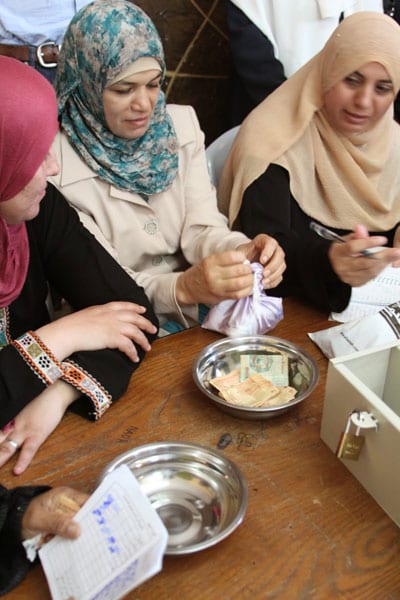“I didn’t understand how to save. I’d spend small amounts on nothing,” says Mysoon Al Harthy, a 45-year-old Iraqi refugee woman living in Jordan. “Now I have a lot of savings”.
Mysoon is standing in a room crowded with about 30 women who, like her, are poor and marginalised. Many cannot work legally because they are refugees. Others are widows, or have sick husbands who can’t earn money. Whatever the reason, the burden of supporting a family has fallen to them.
One by one, the women step forward and put coins or ragged bills in a metal dish. Most can’t give more than one Jordanian dinar — about $1.50. Even that dinar is a sacrifice, but the women do it because they know the power of saving together.
The money is loaned out interest-free to individual women so they can buy ingredients for baked goods, fabric for sewing, beads for jewellery-making or anything these entrepreneurial women think will sell well. CARE/Laura Sheahen.
The money will be loaned out interest-free to individual women so they can buy ingredients for baked goods, fabric for sewing, beads for jewellery-making – anything these entrepreneurial women think will sell well. The women make a profit, put more money in the dish, and help their fellow group members start small businesses in turn.
The women know exactly what they’ll do with the money they earn. Amaal Hassan, 34, will pay for her son’s cancer operation. Hayfa Al Momani, 38, wants to pay her daughter’s university fees – “She’s excellent in school. I hope I can do it.” All the women are happy that the program is run in a way consistent with their Muslim values, charging no interest.
The program, run by CARE and called a Village Savings and Loan Association, aims to empower 2,000 Jordanian and refugee women in poor neighbourhoods. The program encourages savings, trains women in basic business skills and develops bazaars where women can sell their wares. It also raises awareness about domestic violence and how to get help. So far, women in the Jordan program have collectively saved more than $8,000, with 76.7 % of the savings in circulation as loans. It’s part of a CARE strategy that seeks to empower 10 million vulnerable women and girls all around the world.
The VSLA project in Jordan helps the women in several ways. “We’re better at household budgeting,” says one participant. “We know how to buy the basics and still put something in savings.” Most importantly, women have more of a say in where the money they earn goes.
Investing in women is one of the best ways to lift a society out of poverty. That’s why the United Nations made promoting gender equality and women’s empowerment one of its eight Millennium Development Goals (MDGs) for dramatically reducing poverty by 2015.
Despite important successes in Jordan, many women still are excluded from working outside the home. Only 15% of women in Jordan participate in the labour force compared to 69% of men, making it one of the lowest rates across the Middle East and North Africa.
When I visited one VSLA, we were told that when the women meet once a week, it’s rare for them to leave the house like that. Indeed, 14.4% of women surveyed in 2007 in Jordan said they needed their husband’s permission to visit their own family or relatives. Programg like VSLAs chip away at conservative gender rules that keep women from realising their full potential.
The program also develops bazaars where women can sell their goods. CARE/Laura Sheahen
But there have been clear gains in Jordan, especially the country’s success in getting girls into school – another MDG goal. For primary and secondary schools, Jordan reports figures of 97 and 110 female students enrolled for every 100 male students. Female enrolment rates in universities are equally positive, at levels of 107 and 104 females to every 100 males, though female enrolment at science and private universities lags behind.
Many of the women in CARE’s micro savings program did not get an education, but they are working hard – baking dumplings, stringing beads, embroidering shawls and more – to make sure their daughters do. And those who earlier were isolated in their homes – including refugees who feel alienated on several fronts – build relationships with each other and gain confidence.
“They become happy,” says Ghada Abu Batnin, VSLA program manager for CARE Jordan. ‘They think, “I have people who are supportive, who help me sell items and earn money”.
“It gave us ambition and energy. We were not just sitting there wishing we had money,” says Khadra Al Mefleh, a 43-year-old Jordanian woman in Amman. “It changed our lives.’
Check out Care.org for more information on CARE’s work in Jordan.



